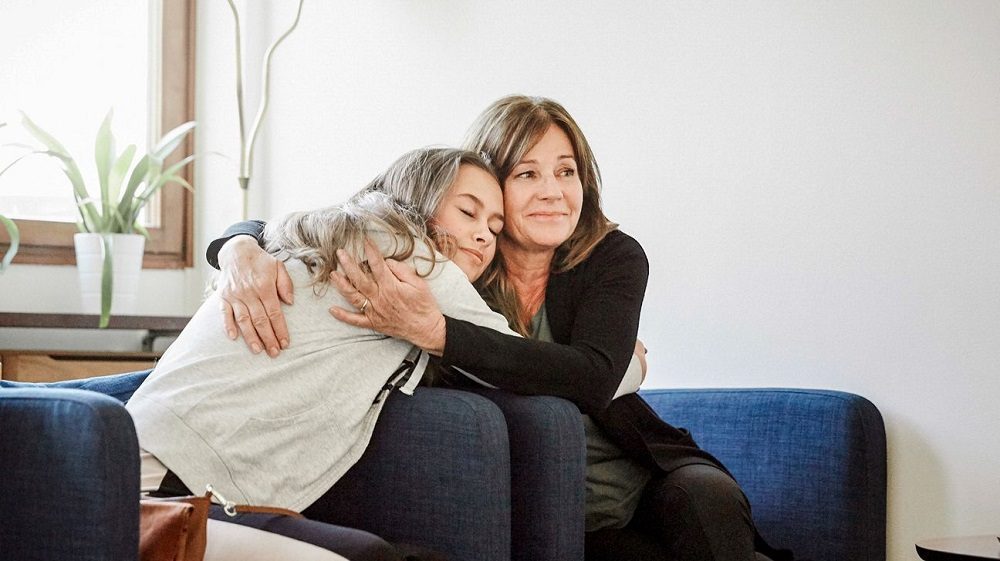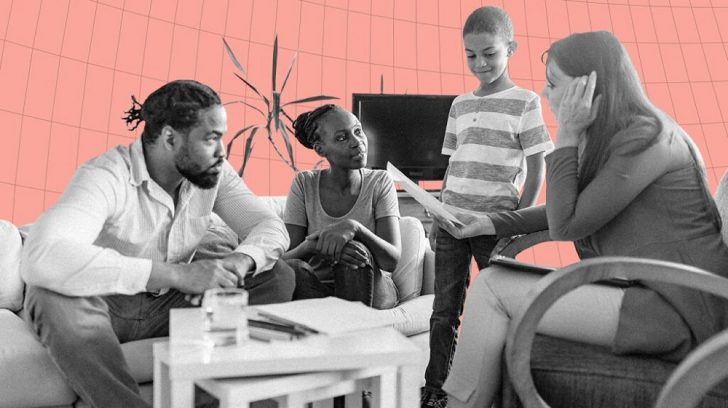
Everything You Need To Know About Family Therapy

Family therapy is a type of psychological counseling provided by a clinical social worker or licensed marriage and family therapist. It helps family members improve communication, resolve conflicts, or navigate difficult times such as losing a loved one or a divorce. Unlike individual counseling, which views problems as residing within the individual, family therapy views problems as patterns or systems that need to be adjusted.
Family therapy doesn’t refer to the number of people present in the therapy session but to a specific perspective or framework for dealing with issues that arise within familial relationships. The family here is not just about blood relatives but can include anyone who plays a long-term supportive role in one’s life. Improved family relationships will help alleviate family tensions and conflicts and benefit an individual’s mental health.
Why it’s done

SDI Productions/ Getty Images | There is no worse parent than an unhappy parent
Family therapy can help you improve troubled relationships with your partner, children, or other family members. You may address specific issues such as marital or financial problems, the conflict between parents and children, or the impact of substance abuse or a mental illness on the entire family.
Your family may pursue family therapy along with other types of mental health treatment, especially if one of you has a mental illness or addiction that also requires additional therapy or rehabilitation treatment. For example, the therapy can help family members cope if a relative has a serious mental illness like schizophrenia. Still, the person with schizophrenia should continue with his or her individualized treatment plan, which may include medications, one-on-one therapy, or other treatment.

Shutterstock/ Pinterest’ | Families come into therapy with their own structure, tone, and rules
In the case of addiction, the family can attend family therapy while the person with an addiction participates in residential treatment. Sometimes the family may participate in family therapy even if the person with an addiction hasn’t sought out his or her own treatment. Family therapy can also be useful in any family situation that causes stress, grief, anger, or conflict. It can help you, and your family members understand one another better and learn coping skills to bring you closer together.
Types of family counselling
Functional family therapy
This short-term treatment is often utilized for young people experiencing problems with risky behavior, violence, or substance use. It helps teens and families look for solutions while building trust and respect for each individual.
Systemic family therapy
This therapy approach considers the family as a unit, in which each member’s actions affect the other people in the family and the family as a whole. Therapy aims to understand family processes, how they influence people, and how they change over time to improve family interactions.

Medical News Today/ Pinterest | A family is the best team you could ever have
Psychoeducation
This type of treatment is centered on helping family members better understand mental health conditions. Family members can function as a cohesive support system by knowing more about medications, treatment options, and self-help approaches.
Structural therapy
Structural therapy manages problems that arise due to the family structure. It aims to achieve a functioning and balanced family hierarchy, with appropriate boundaries between members. The key difference with structural therapies is the focus on structure rather than specific behaviors that cause problems.
More in Family Counseling
-
`
5 Reasons Why Dad’s Side of the Family Misses Out
Family bonds are intricate and multifaceted, often creating a unique tapestry of connections. However, many people notice a peculiar trend: stronger...
July 12, 2024 -
`
A Quick Guide on How to Get Short-Term Disability Approved for Anxiety and Depression
Living with anxiety or depression poses unique challenges, particularly in the workplace, where stress can exacerbate symptoms. For many, short-term disability...
July 5, 2024 -
`
Why Do People Feel Sleepy After Eating?
Is feeling sleepy after eating a sign of diabetes? Well, not directly. There are many reasons why you feel drowsy after...
June 20, 2024 -
`
What Is High-Functioning Depression? Symptoms and Treatment
High-functioning depression may not be a term you hear every day, but it’s a very real and challenging experience for many....
June 13, 2024 -
`
Kelly Clarkson’s Weight Loss Ozempic Journey – Debunking the Rumors
In a refreshing moment of transparency, Kelly Clarkson, the beloved singer and talk show host, sheds light on her remarkable weight...
June 3, 2024 -
`
What Is the Best Milk for Gut Health and Why?
In recent years, the milk section at the grocery store has expanded far beyond the traditional options. While cow’s milk has...
May 30, 2024 -
`
Do Dental Implants Hurt? Here’s All You Need to Know
When you hear “dental implants,” you might wince at the thought of pain. But do dental implants hurt as much as...
May 24, 2024 -
`
5 Key Differences Between A Psych Ward & A Mental Hospital
Curious about the differences between a psych ward and a mental hospital? You are not alone. With the mental health conversation...
May 16, 2024 -
`
It’s Official! “Selling Sunset’s” Christine Quinn & Husband Christian Dumontet Are Parting Ways
Have you ever found yourself unexpectedly engrossed in the personal lives of celebrities, especially when their stories take dramatic turns? Well,...
May 9, 2024










You must be logged in to post a comment Login